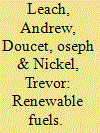| Srl | Item |
| 1 |
ID:
179659


|
|
|
|
|
| Summary/Abstract |
Arctic Drilling is one of the controversial issues in United States (US) politics regarding oil and environmental policies. The story of Arctic Drilling can only be uncovered within the context of being triggered by the tightening global and US oil market at the beginning of the millennium. However, various dynamics have become essential to define whether Arctic Drilling is the best ‘to meet national energy needs’ through this process. Especially, environmental concern, as one of the most determining developments of this process, has led to environment versus energy contradiction that holds debate ground for the issue. Such a contradiction can be recognised and uncovered by a historical-dialectical approach that considers both material and ideational spheres. By applying this approach, this research has found that oil politics, domestic politics and foreign policy orientations of the US are interrelated to determine the perception of Arctic Drilling between policymakers, private industry, local people, environmental groups and lobby groups. This interaction shapes the context of the Arctic Drilling policy process.
|
|
|
|
|
|
|
|
|
|
|
|
|
|
|
|
| 2 |
ID:
105820


|
|
|
|
|
| Publication |
2011.
|
| Summary/Abstract |
This paper examines the impact of government policy on the risk profile of a small ethanol production facility. We derive four key results from a simulation model. First, we show that commodity price risk may discourage investment in a project, despite a positive expected rate of return. Second, we show that political uncertainty may have significant impacts on the risk profile of a project. Next, we show that using only production subsidies to attract investors is expensive, since the financial assistance is paid regardless of whether the plant is operating under positive or negative financial conditions. Finally, we show that a capital grant provides a valuable complement to a subsidy, because the grant reduces the amount of value investors must put at risk, and increases their leverage thereby enhancing returns, while the subsidy mitigates commodity price risk. Our results show that compared to a subsidy-only approach, a grant and subsidy combination provides an investment environment with similar downside protection and expected returns for less than 60% of the cost. Further, we show that the two policy tools combined yield a superior investment environment to that created by an equivalent or greater total investment deployed entirely in either of the policy tools without the other.
|
|
|
|
|
|
|
|
|
|
|
|
|
|
|
|